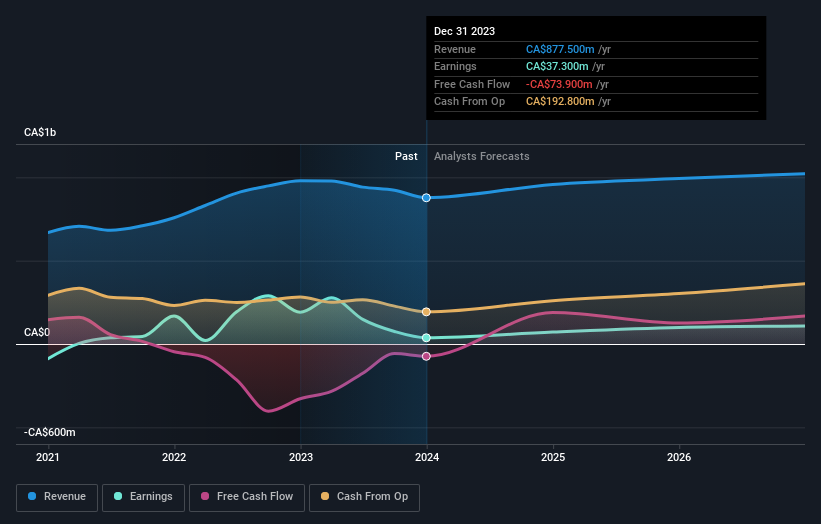Cargojet Inc. Earnings Missed Analyst Estimates: Here's What Analysts Are Forecasting Now
As you might know, Cargojet Inc. (TSE:CJT) last week released its latest full-year, and things did not turn out so great for shareholders. Results showed a clear earnings miss, with CA$878m revenue coming in 3.0% lower than what the analystsexpected. Statutory earnings per share (EPS) of CA$2.17 missed the mark badly, arriving some 53% below what was expected. The analysts typically update their forecasts at each earnings report, and we can judge from their estimates whether their view of the company has changed or if there are any new concerns to be aware of. We've gathered the most recent statutory forecasts to see whether the analysts have changed their earnings models, following these results.
See our latest analysis for Cargojet
Taking into account the latest results, the most recent consensus for Cargojet from twelve analysts is for revenues of CA$957.6m in 2024. If met, it would imply a solid 9.1% increase on its revenue over the past 12 months. Per-share earnings are expected to surge 100% to CA$4.43. Before this earnings report, the analysts had been forecasting revenues of CA$949.1m and earnings per share (EPS) of CA$4.36 in 2024. The consensus analysts don't seem to have seen anything in these results that would have changed their view on the business, given there's been no major change to their estimates.
There were no changes to revenue or earnings estimates or the price target of CA$147, suggesting that the company has met expectations in its recent result. The consensus price target is just an average of individual analyst targets, so - it could be handy to see how wide the range of underlying estimates is. The most optimistic Cargojet analyst has a price target of CA$184 per share, while the most pessimistic values it at CA$115. As you can see, analysts are not all in agreement on the stock's future, but the range of estimates is still reasonably narrow, which could suggest that the outcome is not totally unpredictable.
Another way we can view these estimates is in the context of the bigger picture, such as how the forecasts stack up against past performance, and whether forecasts are more or less bullish relative to other companies in the industry. It's pretty clear that there is an expectation that Cargojet's revenue growth will slow down substantially, with revenues to the end of 2024 expected to display 9.1% growth on an annualised basis. This is compared to a historical growth rate of 17% over the past five years. Juxtapose this against the other companies in the industry with analyst coverage, which are forecast to grow their revenues (in aggregate) 4.4% per year. Even after the forecast slowdown in growth, it seems obvious that Cargojet is also expected to grow faster than the wider industry.
The Bottom Line
The most important thing to take away is that there's been no major change in sentiment, with the analysts reconfirming that the business is performing in line with their previous earnings per share estimates. Fortunately, they also reconfirmed their revenue numbers, suggesting that it's tracking in line with expectations. Additionally, our data suggests that revenue is expected to grow faster than the wider industry. There was no real change to the consensus price target, suggesting that the intrinsic value of the business has not undergone any major changes with the latest estimates.
Keeping that in mind, we still think that the longer term trajectory of the business is much more important for investors to consider. We have forecasts for Cargojet going out to 2026, and you can see them free on our platform here.
You still need to take note of risks, for example - Cargojet has 2 warning signs (and 1 which can't be ignored) we think you should know about.
Have feedback on this article? Concerned about the content? Get in touch with us directly. Alternatively, email editorial-team (at) simplywallst.com.
This article by Simply Wall St is general in nature. We provide commentary based on historical data and analyst forecasts only using an unbiased methodology and our articles are not intended to be financial advice. It does not constitute a recommendation to buy or sell any stock, and does not take account of your objectives, or your financial situation. We aim to bring you long-term focused analysis driven by fundamental data. Note that our analysis may not factor in the latest price-sensitive company announcements or qualitative material. Simply Wall St has no position in any stocks mentioned.

